Are you concerned about drones flying over your private property in the UK?
You’re not alone. There are now more than 450,000 active registered drones in the uk.
As a GVC-licensed drone pilot and owner of the UK’s largest drone survey company, I regularly handle complaints from people who feel their privacy has been invaded by drones.
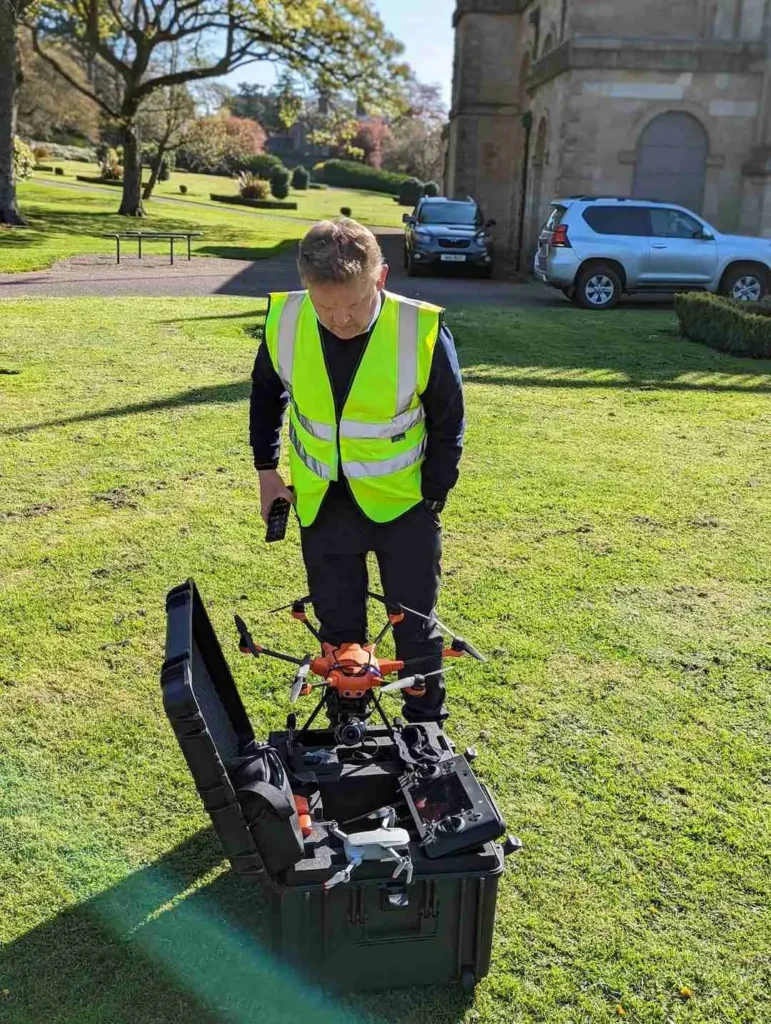
The issue of flying drones over private property is not as straightforward as one might think.
The laws governing this matter are a complex mix of the Civil Aviation Authority’s (CAA) UK drone regulations, airspace restrictions, private property rights, and even the General Data Protection Regulation (GDPR) rules.
I will break down these various rules and regulations to provide a clearer understanding of how they affect you as a property owner.
I will also explore what you can do to prevent drones from flying over your property.
Whether you are a concerned homeowner, a drone enthusiast, or simply someone interested in the legal aspects of drone flight, I hope this guide will provide you with the essential information you need to navigate this complex issue.
Jamies’ Quick Answer
Yes you can fly a drone over private property in the UK, but you must get permission from the landowner to take off and land, adhere to all drone regulations, and respect privacy rights. Specifically, you need to register drones with cameras, inform people if collecting personal data, get consent for filming, and comply with data protection laws like GDPR.
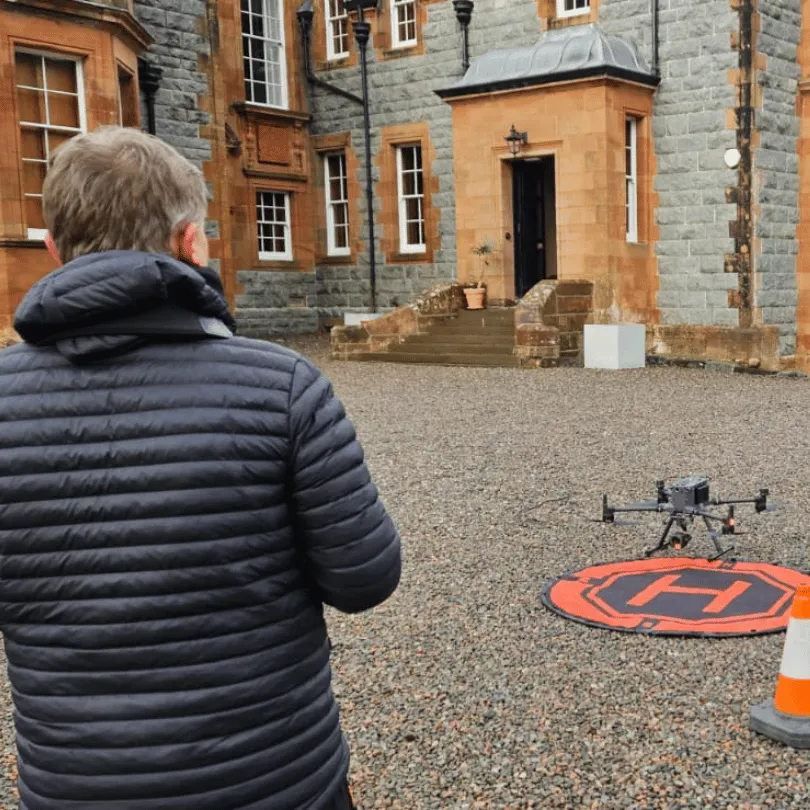
Where Does Your Private Property Airspace Start And End?
When it comes to private property in the UK, you, as the owner, have the right to own, use, and dispose of your property as protected by law.
Historically, landowners were considered to own everything above and below their land, following the Latin maxim “cuius est solum, eius est usque ad coelum et ad inferos,” which means “whoever owns the soil, it is theirs up to heaven and down to hell.“

However since air travel began, this concept has changed, and courts have recognised the impracticality of granting you, the landowner, unlimited airspace rights.
Today, you are considered to have rights to the airspace only up to the height necessary for the ordinary use and enjoyment of your land.
This means that if a drone is flying over your property at a height that doesn’t impact your reasonable use of the land, you may not have a strong legal case against the drone operator.
For example, if a drone is flying low enough to disturb your privacy or pose a safety risk, you might have a legitimate claim.
However, if the drone is flying at a higher altitude and not causing any direct disturbance, your legal options may be limited.
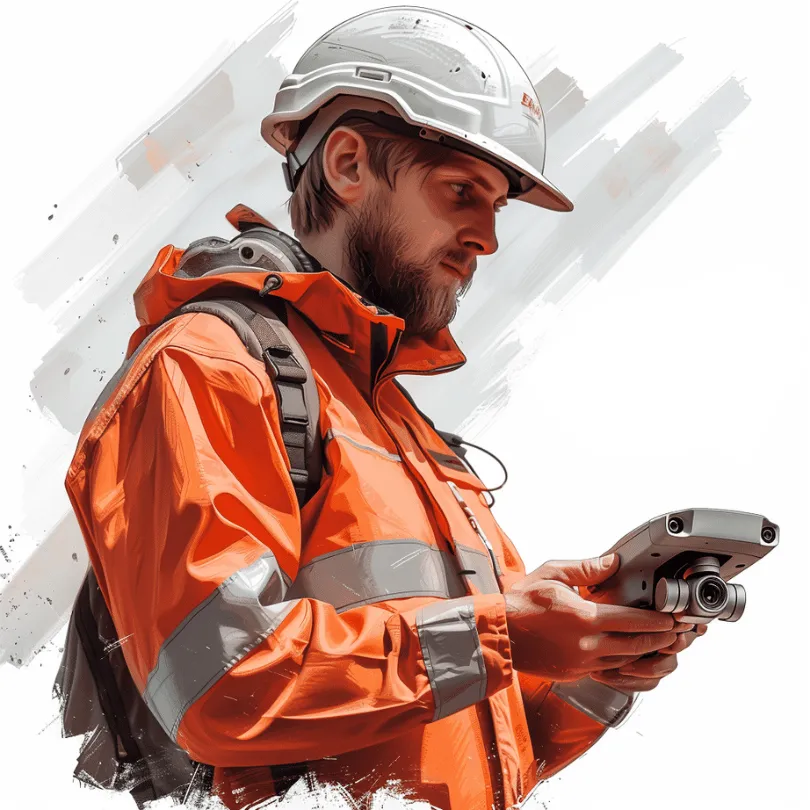
How UK Drone Laws Limits Drone Distance From Private Property
Although you do not own the airspace above your property, this does not mean drones can freely fly right above your garden.
There are drone laws and regulations in place that restrict where drones can and cannot fly, including over crowds or people, even if the people are inside a residence.
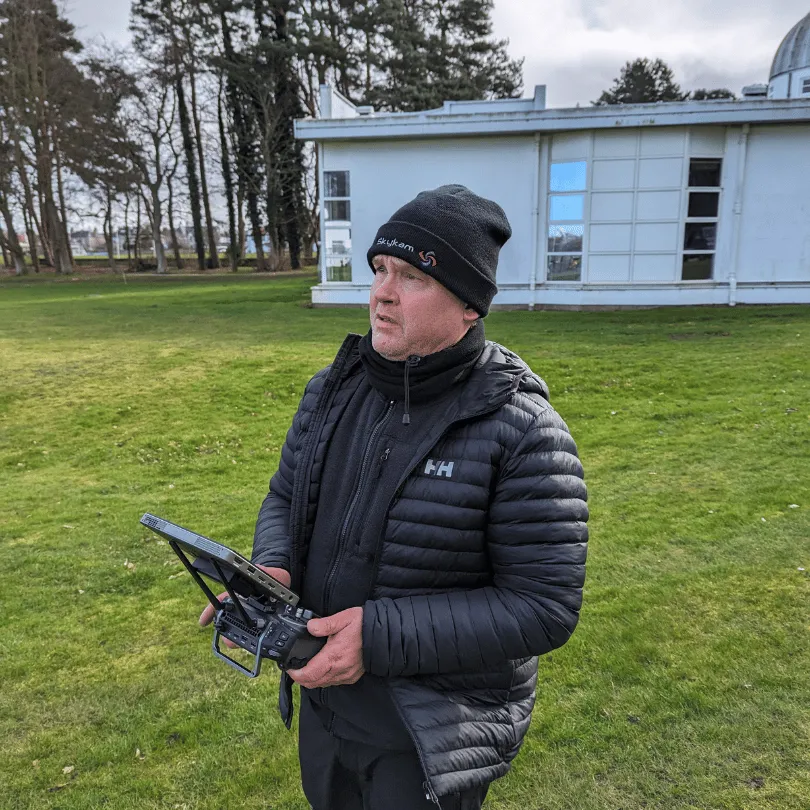
Taking Off And Landing A Drone On Private Property
As a landowner, you may not own the airspace above your property, but you do have control over the ability to take off and land on your land.
Any drone operator must obtain your permission for the specific spot they plan to launch from or land on within your property boundaries.
However a drone operator can still take off from outside your private property boundary and fly over your property at a reasonable height without needing your permission.
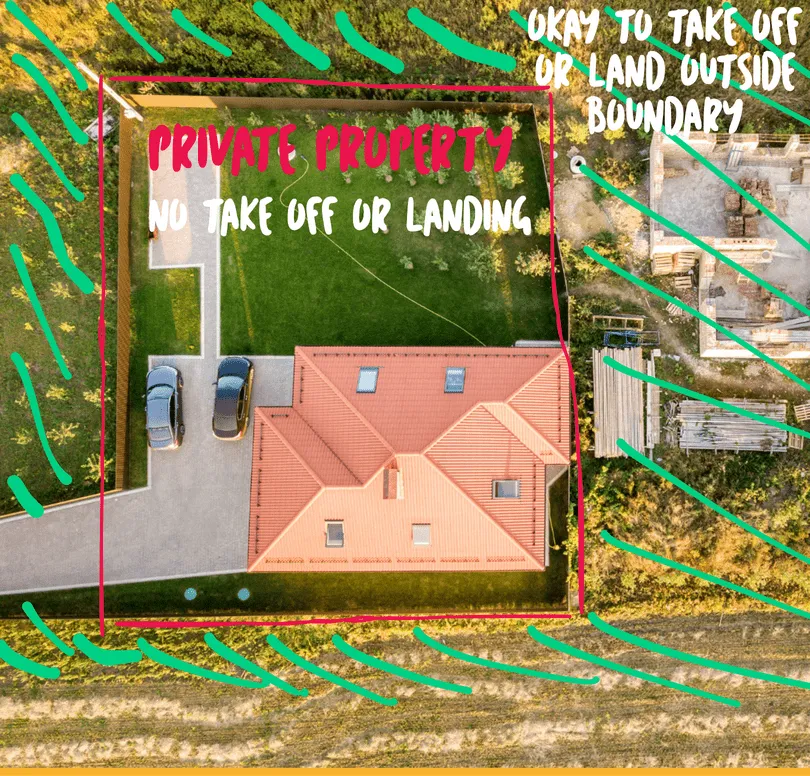
If a drone operator wants to launch or land their drone on your property, it is their responsibility to contact you and secure your permission beforehand.
If they fail to do so and proceed to take off or land on your property anyway, they could be guilty of trespassing, and you may have grounds for legal action.
When it comes to drones and private property, it’s essential for both landowners and drone operators to understand the rules surrounding launching and landing.
As a property owner, you have the right to control access to your land, including the spots used for drone take-offs and landings.

Distance Requirements For Drones Flying Near Private Land
When it comes to flying your drone near private property in the UK, it’s important to understand how the drone regulations apply to you.
The 50-meter rule, which requires you to maintain a distance of at least 50 meters from people, extends to individuals inside private buildings as well.
Imagine you’re flying your drone near a residential area.
You might see people in their gardens, on their balconies, or even inside their homes through the windows.
According to the UK’s drone laws, you must keep your drone at least 50 meters away from these people, even if they are within the boundaries of their own private property.
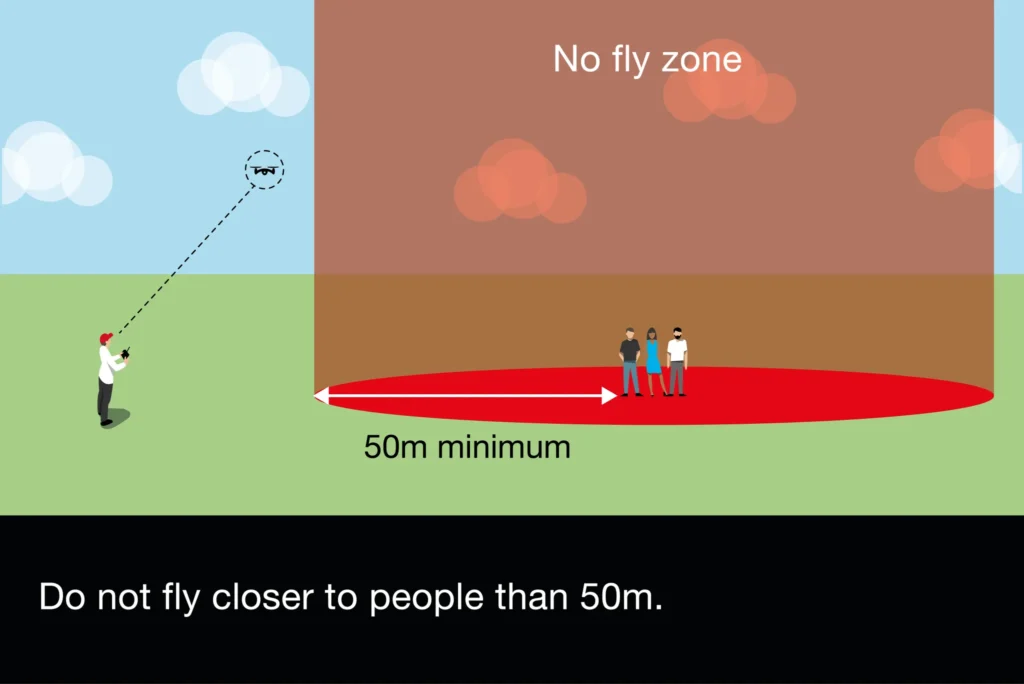
This 50-meter no-fly zone around people on private property forms a cylindrical shape that extends upwards to the legal height limit for drones.
As the drone pilot, it’s your responsibility to ensure that your drone remains outside of this invisible cylinder.
However, there is an exception to this rule.
If your drone weighs less than 250 grams, you are not legally required to maintain the 50-meter distance from people on private property.
Most popular drones – DJI mini range – sold in the UK fall into this weight category.
Despite this exception, it’s still crucial to fly your drone responsibly and respect the privacy of others. Always keep your drone within your line of sight, and avoid flying it directly over private property without the owner’s permission.
By following these guidelines, you’ll be able to enjoy flying your drone while ensuring the safety and privacy of those around you.
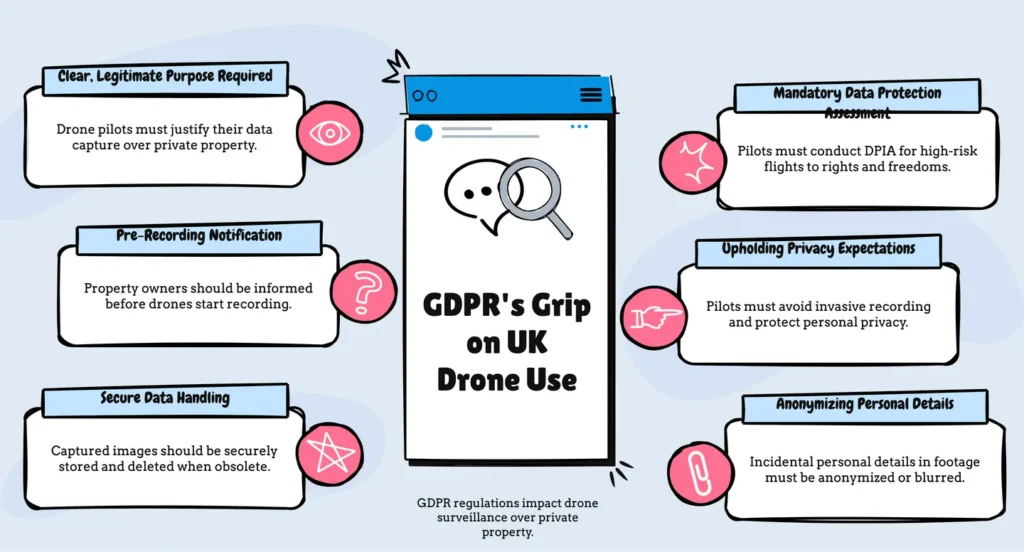
GDPR, Data Collection, Drones And Your Private Property
As a property owner, it’s essential to understand how the General Data Protection Regulation (GDPR) applies to drones flying over your land.
The GDPR is a comprehensive law that safeguards people’s personal information and grants them control over how companies use it.
Following Brexit, the UK incorporated the GDPR into domestic law as part of the Data Protection Act 2018, now known as the ‘UK GDPR,’ which took effect on January 31, 2020.
When a drone equipped with a camera flies over your property, the images or data captured may constitute personal data and fall under the scope of GDPR.
Here’s what you need to know:
Clear And Legitimate Purpose
Drone pilots must have a clear and legitimate purpose for capturing and processing the image data over your property.
They should only capture what is necessary for their stated purpose. If a drone pilot is unable to provide a valid reason for flying over your land, they may be in violation of GDPR.
Data Protection Impact Assessment (DPIA)
If a drone pilot’s activities pose a high risk to your rights and freedoms, they must conduct a Data Protection Impact Assessment (DPIA).
This assessment helps identify and mitigate privacy risks. As a property owner, you have the right to inquire about the DPIA and ensure that the drone pilot has taken appropriate measures to protect your privacy.
Informing You Before Recording
Drone pilots must inform you before they start recording over your property. This can be done by putting up signs, making their drone visible, and providing easy access to their privacy policy.
If you notice a drone flying over your land without any prior notice or information, the pilot may be breaching GDPR regulations.
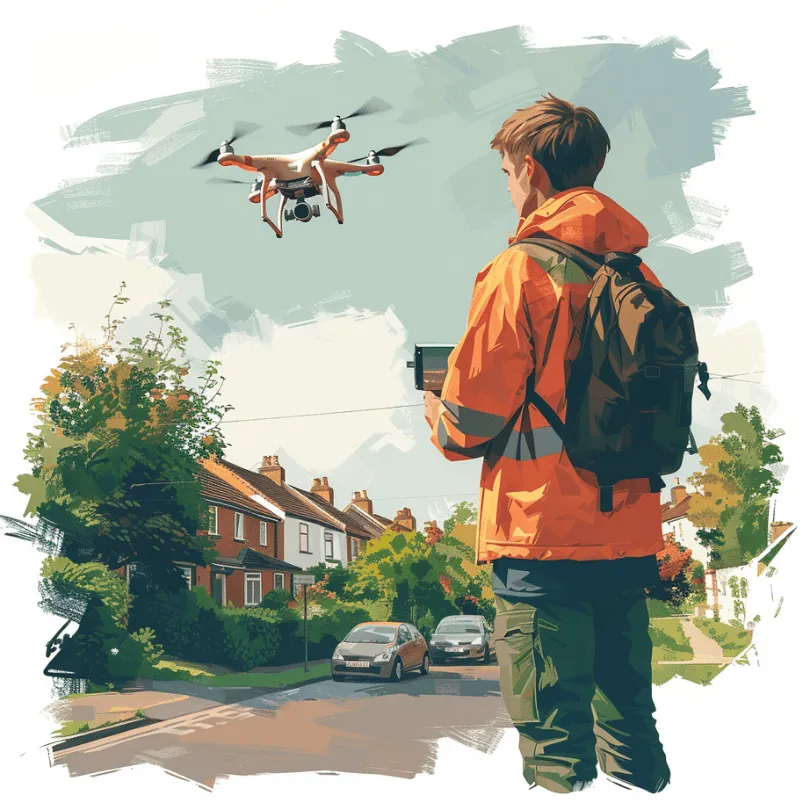
Respecting Your Privacy Expectations
Drone pilots must respect your reasonable expectations of privacy. They should avoid hovering and recording near your home and private property without your permission and minimize capturing images of bystanders and uninvolved individuals.
If you feel that a drone pilot is intruding on your privacy, you have the right to raise your concerns and take appropriate action.
Keeping Your Data Safe And Deleting It When No Longer Needed
Drone pilots must keep the captured images of your property safe and secure. They should apply appropriate security measures to protect the data during storage and transmission.
Additionally, they must delete the images when they are no longer needed for their intended purpose. You have the right to inquire about how long your data will be stored and when it will be deleted.
Anonymizing Or Blurring Personal Details
If a drone pilot incidentally captures personal details like faces, license plates, or identifying features on your property that are not needed for their purpose, they must anonymize or blur these details.
This helps protect your privacy and ensures that your personal data is not unnecessarily exposed.
Allowing You To Access, Obtain A Copy, Or Request Erasure Of Your Data
As a data subject, you have the right to access the personal data captured by a drone pilot flying over your property.
You can request a copy of the data and even ask for its erasure if you believe it is no longer necessary for the pilot’s stated purpose. Drone pilots must honor these requests in accordance with GDPR regulations.
Assessing Context Before Sharing Images Publicly
Before sharing any drone-captured images of your property publicly or on social media, pilots must carefully assess the context and surroundings to ensure compliance with GDPR.
If you discover that images of your property have been shared without your consent or in a manner that violates your privacy rights, you can take action against the drone pilot.
By understanding these key aspects of GDPR and how they apply to drones flying over your property, you can better protect your privacy rights and ensure that drone pilots operate within the boundaries of the law.
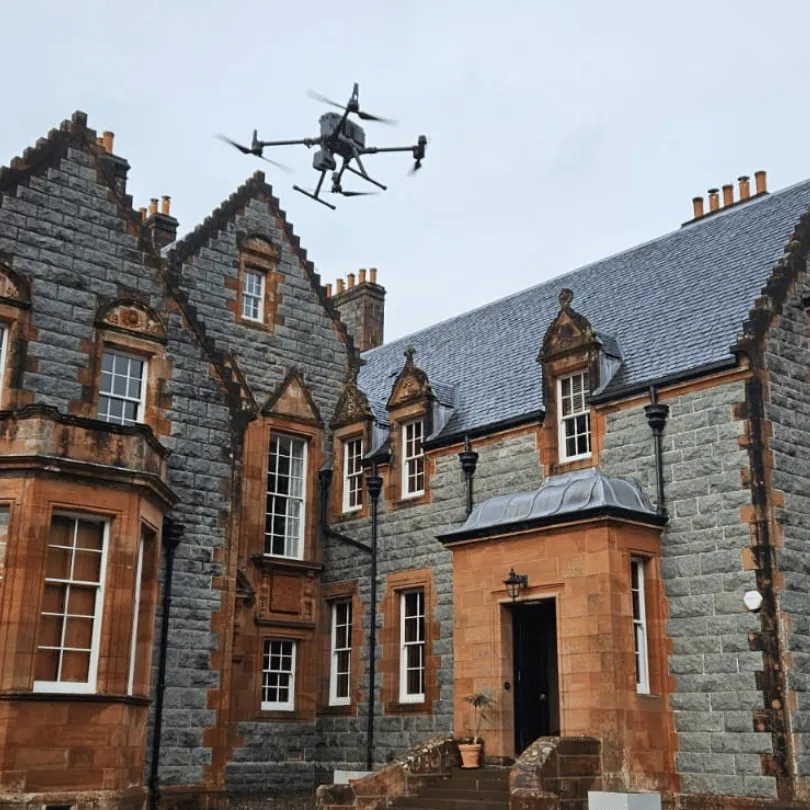
To help you navigate this situation, I have put together a list of 8 essential questions you can ask the drone pilot to verify their compliance with GDPR.
These questions cover key aspects such as data protection impact assessments, privacy policies, data security measures, and your rights as a data subject.
By asking these questions, you can quickly determine whether the drone pilot is operating legally and taking the necessary steps to safeguard your personal information.
It may surprise you to learn that a staggering 90% of drone pilots flying over private property are not fully compliant with GDPR requirements.
This means that there’s a high likelihood that the drone pilot above your land may be violating your privacy rights, whether intentionally or not.
To access my insider tips and the complete list of 8 GDPR questions to ask drone pilots, simply enter your email address below.
My 8 Questions To Stop Pilots Disturbing Your Property
- Can I see your Data Protection Impact Assessment (DPIA) to understand how you’ve identified and mitigated privacy risks?
- How are you ensuring that the image data captured is limited to what’s necessary for your stated purpose?
- What specific measures are you taking to respect my privacy, such as maintaining a reasonable distance from my property and avoiding the capture of uninvolved individuals?
- Can you explain in detail how you will keep the captured images secure, and when exactly will you delete them once they’re no longer needed?
- What is the process for me to access my personal data, receive a copy, or request erasure, and can you provide me with your contact information to exercise these rights?
- If you incidentally capture personal details that are not needed, what specific methods will you use to anonymize or blur these details before further processing or sharing the images?
- Can you share with me your assessment of the context and surroundings to demonstrate how sharing any captured images publicly or on social media will not infringe upon my privacy rights?
By asking to see relevant documentation and requesting more detailed explanations of their data protection practices, you can better ensure that the drone pilot is fully compliant with GDPR.
Check they are actively working to protect your privacy rights.
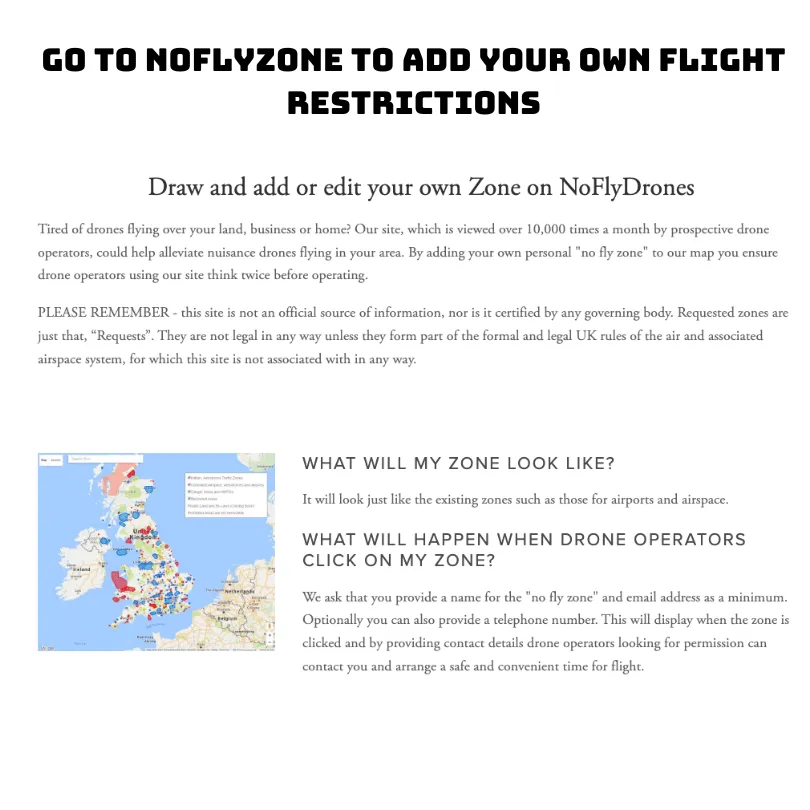
How To Prevent Drones Flying Over Your Private Property In The UK
Now, there is no single map that drone pilots use to check flight restriction zones. However, one of the most popular online resources is NoFlyDrones.co.uk.
This website is frequently used by drone pilots before taking off to check if there are any flight restriction zones in place.
If you happen to live near a popular scenic spot for drone flying and want to establish your own no-fly zone over your private property, NoFlyDrones.co.uk allows you to do so.
Once you create a no-fly zone, it takes 24 hours to go live on the platform.
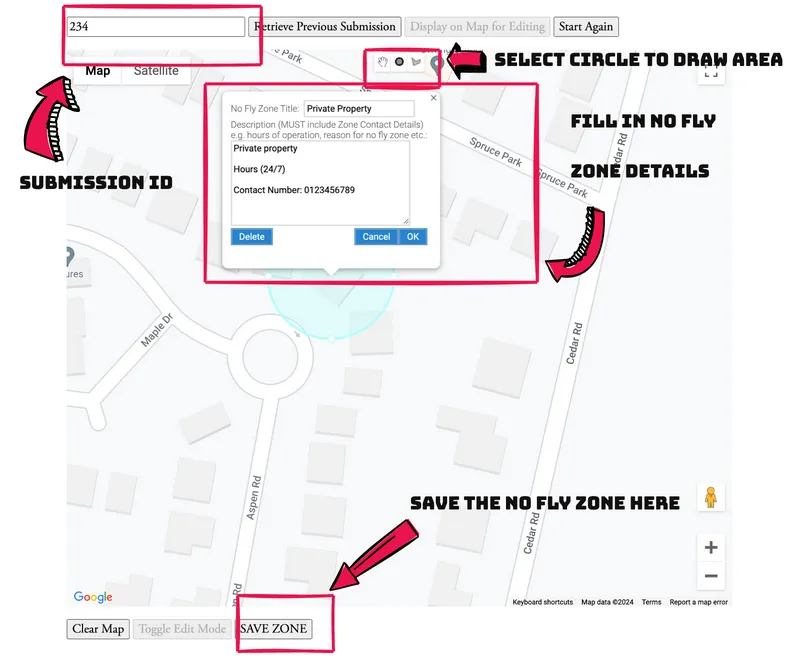
To request a no-fly zone over your private property, follow these simple steps:
- Go to NoFlyDrones.co.uk/addzone.
- Scroll down to the interactive map and locate your property.
- Enter a submission ID at the top left of the page. Choose something memorable and meaningful to you.
- At the top middle of the map, once you have located your property, click the center circle. This allows you to draw a no-fly circle on the map, encompassing your property.
- Title the zone as “Private Property.”
- In the description, you must include zone contact details, such as an email address. Specify the hours of operation, which is usually 24/7 for private property. Also, state the reason for the no-fly zone, which in this case is “Private Property.”
- Finally, click “Save Zone” at the bottom of the page to submit your request.
By following these steps, you can create a no-fly zone over your private property, which will be visible to drone pilots using NoFlyDrones.co.uk.
This can help deter unwanted drone activity and protect your privacy.
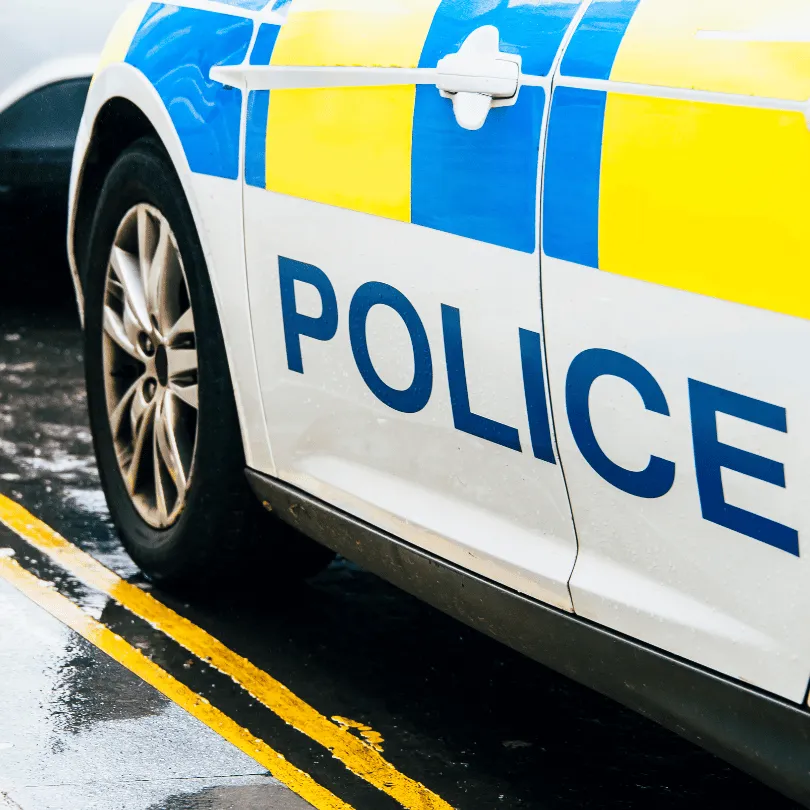
Can You Phone The Police When A Drone Is Flying Over Private Property UK
If you find a drone buzzing over your private property in the UK and you feel your privacy is being invaded, you can absolutely phone the police.
When faced with such a privacy infringement, involving the police can be an appropriate course of action.
The Civil Aviation Authority (CAA) advises contacting the police on the non-emergency number, 101, if you have concerns about a drone flying over your property.
By reporting the incident to the police, the drone operator could face legal consequences for infringing on your right to privacy and control over your property.
It’s important to note that their actions could potentially be considered trespassing, which is a violation of UK law.
If the drone continues to be a nuisance even after you’ve contacted the police, it may be wise to seek legal advice.
A legal professional can assess your situation and guide you on the most effective course of action to protect your privacy rights.
Remember, you have the right to enjoy your private property without unwanted intrusions from drones.
Don’t hesitate to involve the police and seek legal counsel if necessary to safeguard your privacy and peace of mind.
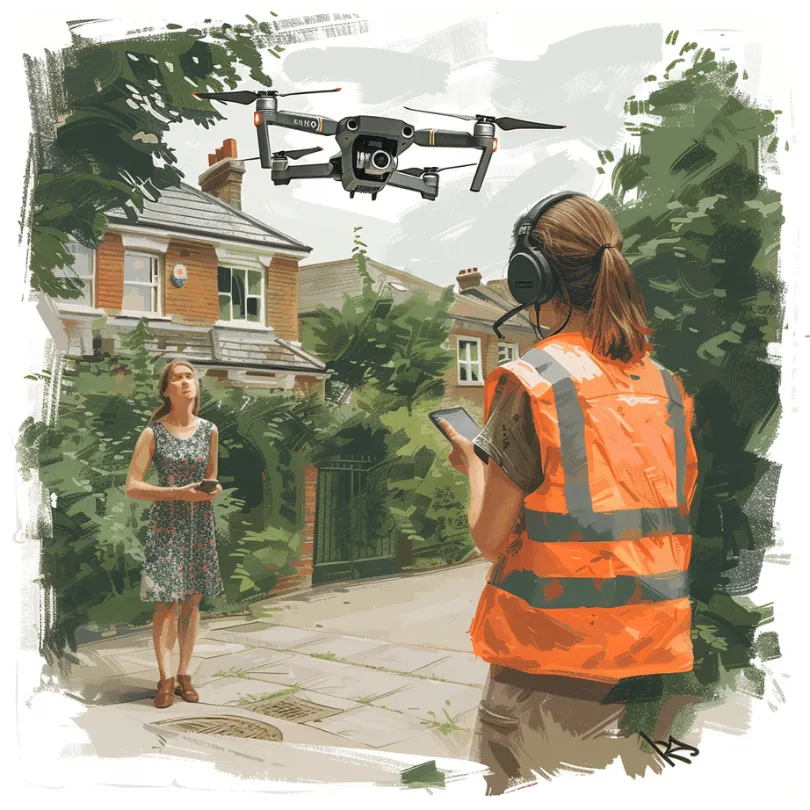
Details You Should Capture From The Drone Pilot
Before you dial 101, make sure you’ve gathered as much detail about the drone and its pilot as you can.
- Begin with Drone Identification; take note of the drone’s make, model, colour, size, and any distinguishing features it may possess. This information can be crucial in aiding the authorities in their investigation.
- Next, focus on Pilot Verification. If possible, discreetly try to capture the physical and clothing description of the drone operator.
- In some cases, the pilot could be operating the drone from a nearby vehicle, so don’t forget to note registration numbers if applicable.
- Moving on, take stock of the Essential Equipment being used. This includes the controller device, any additional screens or monitors, and even the carrying case for the drone. All these details can assist in pinpointing the drone’s origin.
- Flight Log Importance shouldn’t be underestimated either. If you’re able to speak to the operator, ask about their flight logs. These records can provide evidence of previous flights over your property.
- Lastly, consider Insurance Necessities. The operator should be insured to fly their drone, particularly if it’s being used commercially. Request proof of insurance, as this can be vital in any subsequent legal proceedings.
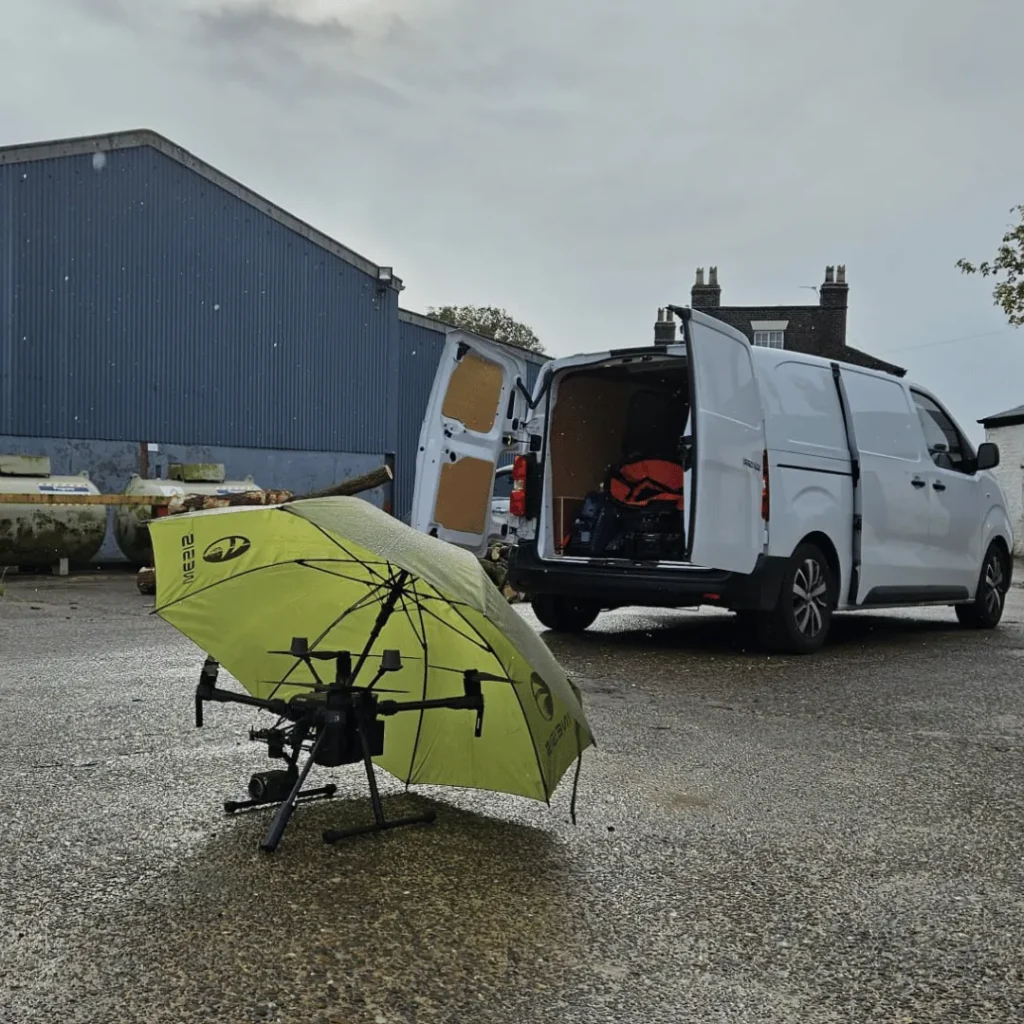
Reasons A Drone Could Be Flying Over Private Property UK
One of the most prevalent reasons is surveying and aerial photography.
Drones equipped with high-quality cameras are increasingly being used for mapping, inspections, and capturing stunning aerial shots.
However, this can quickly turn into an invasion of privacy if the drone is capturing images or videos of your personal space without your consent.
Another reason could be drone surveillance, which is often employed by property developers, security companies, or even curious neighbors.
While there might be legitimate reasons for such surveillance, it can still feel like a violation of your privacy and solitude.
Moreover, drones can be a source of noise pollution.
The constant humming and buzzing of the drone’s motors can be a significant disturbance to your peaceful environment, leading to increased stress levels and annoyance.
In addition to the human impact, drones can also have a detrimental effect on the local wildlife. The presence of drones can startle and disorient nesting birds and other animals, potentially causing harm to the delicate ecosystem surrounding your property.
Lastly, drone trespassing is a serious concern.
This occurs when unauthorized drones enter the airspace above your property without your permission. The reasons behind this could range from ignorance of drone laws to a blatant disregard for private boundaries.
Regardless of the reasons behind a drone flying over your private property, it is essential to address the issue promptly.
Whether it’s through open communication with the drone operator, reporting to the relevant authorities, or seeking legal advice, taking action is crucial for maintaining your privacy, tranquility, and the well-being of your personal space.
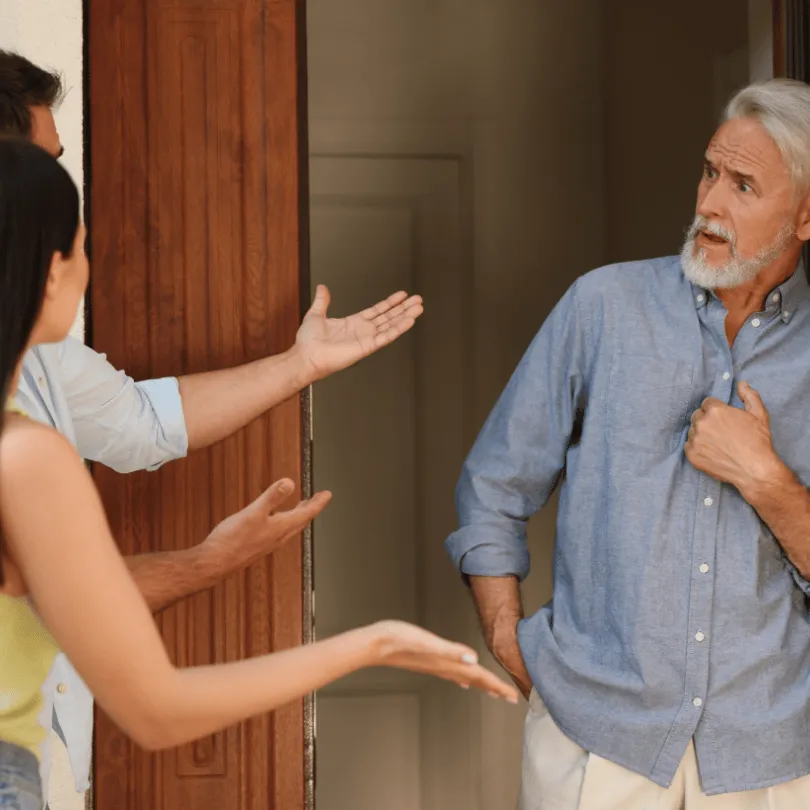
Dealing With A Neighbour’s Drone Flight Over Your Private Property UK
If you are dealing with a Neighbour who is flying a drone over your property, it is important to approach the situation in a calm and non-confrontational manner.
In most cases, a Neighbour who is unaware that their drone is causing a disturbance or inconvenience may be willing to cooperate and stop flying the drone over your property once they are made aware of the issue.
Approach The Situation In A Non-Confrontational Manner
When dealing with a Neighbour’s drone flight over your property, it is best to approach the situation in a calm and non-confrontational manner.
This means avoiding any actions that may be perceived as aggressive or threatening, such as yelling or making physical threats.
Instead, try to engage in a constructive dialogue with your Neighbour, in order to find a solution that is mutually beneficial.
Communicate Your Concerns And Ask Them To Stop Flying The Drone Over Your Property
When speaking with your Neighbour about their drone flight over your property, it is important to clearly communicate your concerns and ask them to stop flying the drone over your property.
You can explain why the drone flight is bothering you, such as if it is causing a noise disturbance or if you feel that it is invading your privacy.
It may be helpful to provide some specific examples of instances when the drone flight has been particularly bothersome, in order to help your Neighbour understand your perspective.
Here are some suggestions for how to approach the conversation with your Neighbour:
- Explain your concerns: Let your Neighbour know how the drone flight is affecting you and why it is a problem. For example, you may be concerned about privacy, safety, or the noise and disruption caused by the drone.
- Ask them to stop flying the drone over your property: Clearly and politely request that your Neighbour stop flying the drone over your property. It may be helpful to suggest alternative locations where they could fly the drone instead.
- Offer to discuss the issue further: If your Neighbour is open to dialogue, offer to discuss the issue further and come to a mutually-agreeable solution. This may involve finding a compromise or finding ways to mitigate the impact of the drone flights on your property.

Avoid Physical Confrontations Or Other Potentially Harmful Actions
It is important to avoid taking any physical or legal actions that may be harmful or illegal, such as damaging the drone or threatening to sue your Neighbour.
These actions may only serve to escalate the situation and potentially lead to further conflict.
Instead, try to focus on finding a peaceful and mutually beneficial resolution, such as agreeing on a set of ground rules for your Neighbour’s drone flight over your property.
Consider Seeking Legal Remedies, If Necessary
In some cases, it may be necessary to seek legal remedies in order to address a Neighbour’s drone flight over your property. This could include seeking an injunction or damages from the drone
![Can You Fly A Drone Over Private Property UK [year] 3 dji mavic 3](https://skykam.co.uk/wp-content/uploads/2024/04/dji-mavic-3.webp)
It is important to remember that physical confrontations or other potentially harmful or illegal actions should be avoided at all costs.
These types of actions can escalate the situation and may result in legal consequences for both parties. Instead, focus on finding a peaceful and respectful solution through communication and negotiation.
In some cases, it may be necessary to seek legal remedies if your Neighbour is unwilling to cooperate and stop flying the drone over your property.
For example, if the drone flights are causing a nuisance or a significant interference with your enjoyment of your property, you may be able to seek an injunction to prevent further flights.
Alternatively, you may be able to seek damages from the drone operator if they are causing harm to your property or infringing on your legal rights.
In conclusion, dealing with a Neighbour’s drone flight over your property can be challenging, but it is important to approach the situation in a calm and respectful manner.
Can You Fly A Drone Over Private Property UK Conclusion
In conclusion, flying drones over private property in the UK requires careful consideration of laws, regulations, and privacy concerns. While not outright prohibited, drone flights should respect landowners’ rights and minimize disturbance.
Seeking permission before takeoff and landing is advisable, along with registering as an operator and securing consent for data collection if equipped with a camera.
Should an unauthorized drone invade your airspace, contacting authorities or requesting a no-fly zone may help resolve the issue.
With awareness and responsible piloting, drone enthusiasts can enjoy their craft while upholding safety and cooperation with communities.
Moving forward, a collaborative effort between drone operators, property owners, lawmakers and the public will be key in finding the right balance between innovation and privacy.
![Can You Fly A Drone Over Private Property UK [year] 2 can you fly a drone over private property uk 1 1](https://skykam.co.uk/wp-content/uploads/2024/04/can-you-fly-a-drone-over-private-property-uk-1-1.webp)
Thank you for this great article and advice. I am very interested in your views on the legality of an Estate Agent publishing aerial photos of a neighbouring property they are marketing that clearly show the whole of my property too, without my prior knowledge or consent. In this instance, the drone operator presumably had the permission of my neighbour to fly over and photograph their property. However, in doing this, they have captured and published detailed footage of the whole of my property too. These photos include the rear of my house and back garden, neither of which can be seen from the road. In your opinion, does this constitute a breach of GDPR?